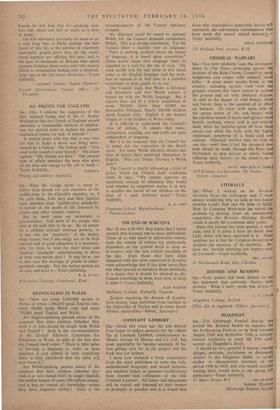SIR,--There are some 2,600,000 people in Wales, of whom 1,800,000
speak English only, while 50,000 speak Welsh only and some 750,000 speak English and Welsh.
Are English-speaking parents aware of the proposal that their children (whether they wish it or not) should be taught both Welsh and English '2 Such is the recommendation of the Central Advisory Committee 'for Education in Wales, in spite of the fact that the Council itself states: "There is little value in learning a language in order to have acquired it and indeed in such conditions there is little ,likelihood that the child will ever learn it."
Are Welsh-speaking parents aware of the proposal that their children (whether they wish it or not) should NOT be taught English, the mother tongue of some 200 million people, and a key to almost all knowledge—unless No objection could be raised to optional Welsh, but the Council demands compulsory Welsh. This is a strange conclusion. For the Council takes a realistic view of language: " There is nothing mystical about the nature of language, it is based upon convention." .These words mean that language must be regarded as a tool for the use of man. The most useful tool for any child in this island today is the English language and the prob- lem of schools is to find time in a crowded curriculum to train pupils in its use.
The Council urges that Wales is bilingual and bicultural and that Welsh culture is hound up with the Welsh language. But it reports that, out of a school population of some 300,000. fewer than 40,000 are thorouffily bilingual. Nearly 200,000 children speak English only. English is .the mother tongue of most children in Wales today.
It is difficult to understand the Council's view of culture. It admits that music, architecture, painting, arts and crafts are quite independent of language.
But it is the language that the Council has in mind, not the expression of the Welsh spirit, Yet many Welsh scholars, divines and men of letters have expressed themselves in English. Was not Dylan Thomas, a Welsh poet ?
The Council is clearly advocating a kind of policy which the Council itself condemns when it says: " We cannot approve an unrealistic concept of education that would tend whether its supporters realise it or not, to sacrifice the future of our children on the altar of a past, however great."—Yours faithfully,


































 Previous page
Previous page